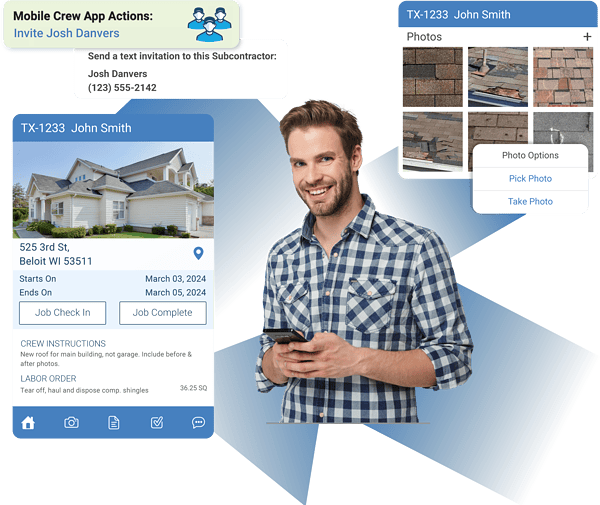The success of your roofing business depends on clear, effective communication between team members and across your organization. But when language barriers arise and workers are not fully able to understand each other, it can create unforeseen challenges. As more roofing companies hire Spanish-speaking crews, they often find themselves dealing with problems associated with miscommunication, from simple missteps on the job site to more serious work-related accidents.
In this blog post, we’ll discuss how roofing contractors can break down language barriers, including simple, technology-based solutions that can help improve team productivity and eliminate the miscommunications that can lead to project delays or unexpected costs.
The changing demographics of the roofing industry
Over the past decade, the roofing industry has gotten increasingly diverse, with the fastest-growing demographic being Latino and Hispanic roofing workers. Around 30% of roofers identify as Latino/Hispanic, representing a 40% increase in that number since 2010. In addition, 36% of roofing crews speak non-English languages, with Spanish being the most common language spoken among those crews.
Despite these demographic realities, the majority of roofing business transactions are conducted in English, and much of the training material, written instruction, and documentation is only available in English. This means many roofing employees are frequently receiving communications in a language they may not be fluent in or comfortable speaking, and are expected to pass along information about the job in this same language.

Communication challenges arising from language barriers
Communication among roofing employees is already a challenge, even when all the employees speak the same language—the work involves many moving parts, projects change quickly in real time, and employees are spread out across many locations. When workers are not able to fully understand each other, this adds an extra barrier which can increase the likelihood of errors, delays and even accidents.
Language barriers can impact the quality and efficiency of roofing work in two primary ways. First, when roofing crews receive instructions in a language they’re not fluent in, they may not fully grasp the scope of their job tasks. This can lead to a wide range of challenges. The project might progress more slowly because of the time that must be taken to clarify expectations and ensure that everyone is on the same page about what the work involves. Errors such as inaccurate measurements, missed tasks, or damage to the customer’s property might arise due to misinterpretation of the instructions, impacting customer satisfaction. In the worst-case scenario, accidents and injuries might occur because safety information was not available in the worker’s primary language.
Second, language barriers affect the information that office staff receive from the job site. Crew members who are not comfortable speaking English may be hesitant, or even unable, to provide updates about how work is progressing and whether anything needs to be changed. Questions from homeowners may not get passed along to the appropriate party. As a result, more visits to the job site may be required in order to get an accurate picture of the work being done and ensure everything is running smoothly.
Overcoming language barriers and improving communication with multilingual employees will help roofing businesses complete projects on time, provide better customer service, and ensure the safety and well-being of their employees.
Breaking down the language barrier
The first step to breaking language barriers is understanding the demographics of your roofing company and recognizing the challenges you are facing. How many multilingual employees are on your crews? How many are on your office staff, sales teams, or management teams? What kinds of communication challenges have you faced in the past?
Once you’ve identified the language issues facing your roofing company, you can begin to take action. One important way to break down language barriers is to ensure that instructions, safety information, and other essential roofing communications are translated into the most common language spoken by your crews (usually Spanish). Being able to read a checklist or a safety poster in the language they are most familiar with will better help bilingual crews grasp what they should be doing.
Another way to improve communication over the long term is for your roofing company to recruit and hire more employees who are fluent in both English and Spanish, particularly for roles that involve lots of communication with crews. Having bilingual employees on staff will make it easier for everyone to understand each other and create an atmosphere where crew members are more comfortable speaking up, even if they don’t speak English well.

How the AccuLynx mobile Crew App simplifies bilingual communication
At AccuLynx, we created our mobile Crew App to reduce errors and improve communication with crews—including Spanish-speaking crews.
With the mobile Crew App, you can stay connected to your crews and find out what’s happening on the job site by:
- Sending crew assignments
- Creating custom job checklists
- Messaging with crew members
- Reviewing job site photos
- And more!
And it includes English and Spanish translation features to help break down language barriers. Data shared from AccuLynx in English can be viewed in Spanish, and Spanish data can be translated back to English. This means that your Spanish-speaking crews can ask questions in their native language and you can answer them in English. With the translation features in the AccuLynx mobile Crew App, you can have confidence that important details about your jobs are being communicated effectively and that your crews understand what is expected of them.
Improve communication across your entire roofing business
Overcoming language barriers and eliminating communication issues are essential for growing your roofing business. To learn more about how AccuLynx can help you improve communication and to see our bilingual translation features in action, schedule a custom demo today.

